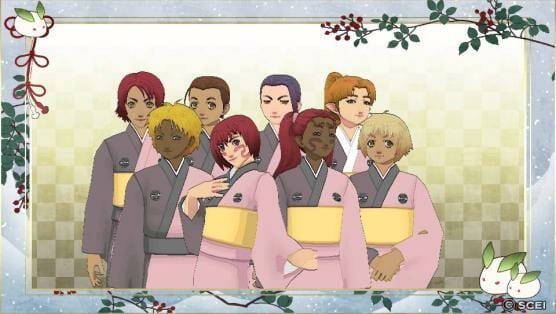Oreshika: Tainted Bloodlines—Thicker Than Water

My final few days playing Oreshika: Tainted Bloodlines were not exactly fun. I was repeating the same boss fights, running the same dungeons, eking every point that I could out of my clan’s current generation before their time was up and I would need to focus on their offspring instead. I was no longer interested in unraveling the intricacies of each map the game had generated for me, or imbuing the heirloom weapons crafted for the founder’s progeny with new powers, or freeing gods from earthly prisons so they could join the pantheon from which I was selecting my clan members’ mates. I was rushing through the illuminated paths and the multicolored hot spring puzzles that had captivated me a few days earlier, desperate to get as strong as possible, as fast as possible.
As it turns out, that is the worst way to play this game.
In Oreshika, you’re at the helm of a clan that’s been cursed with dramatically shortened lifespans and is unable to produce children with any mortal who doesn’t share their fate. Immortals are altogether exempt from this rule, however, and they’re glad to volunteer their genetic material to help strengthen your clan as long as you earn their favor first. The resulting gameplay loop is a little like Massive Chalice in that you are constantly replenishing your pool of fighters with their slightly more capable kids. Unless you’re a particularly bad matchmaker (or hit a patch of rough luck with unfavorable recessive genes) each generation is stronger than the last. Some of them may even inherit an immortal parent’s unique physical traits, like cat ears or horns.
(Aside: It’s utterly ridiculous to me that the pantheon is divided along gender lines for breeding purposes when conception comes in the form of magical golden bubbles and can happen between a 15-month old adult human and a baby with a bamboo shoot coming out of his head or a sentient blob of mochi. But whatever. At least the distribution of power between sympathetic gods and cursed mortals makes the procreation mechanic in Oreshika infinitely less creepy than it is in Conception.)
Yet as strong as your god-babies will one day be, you need to take the time to train them first. My current generation had been a hopelessly underpowered group of rag-tag newborns not so long ago. Months of turn-based grinding had produced a highly capable team: A hammer-wielding wrecker and sword-bearing fencer stood firm in the front row, while a martial artist and a priestess delivered focused attacks from the back. As they blew past their primes, and the signs of age (a cursed tattoo—what two-year old has wrinkles?) began to creep across their faces, I felt like I was grasping at my last chance. The last gleaming thread of hope. If that thread snapped it would be a while before we’d be in fighting shape again, and dear god I needed to finish this game already. I dreaded the thought of spending another in-game year grinding until the next generation would be able to hold their own… Or maybe even the generation after that.
Then again, maybe we were ready. When I asked Kochin, the clan’s adorable human/weasel advisor, to suggest a course of action, she pressed me on towards the final encounter. Kochin had been my rock. The game encourages you to lean on your upbeat aide quite strongly in the beginning, and for good reason. In addition to making recommendations about what you should do next, she meticulously journals (and illustrates) what you’ve been up to, keeps a complete family tree, charts your clan’s strength over time, and offers tips and reminders about everything from basic combat to the odd little gimmicks of each dungeon type that you’ve encountered. She cheers you on in battle, consoles you after the loss of a clan member, and welcomes the new arrivals that replace them. In short she’s incredibly useful and brimming with personality. She’s a treasure, and she’d never steered me wrong before. Kochin seemed convinced that the team was capable, and helpfully suggested an array of boss-oriented supplies that I could bring along to increase my odds of success.
I didn’t win. I lost, and jammed my left thumb down on the PS button and swiped the game shut with my right. I had performed this gesture countless times while playing Oreshika, more for the cathartic release it provided than to avoid any actual consequences in the game. Oreshika is actually very forgiving. Defeat doesn’t necessarily mean death. Most of the time, defeat just means “Come back in a couple months, kiddo.” Even so, I was frustrated.
But if Kochin said I could do it, then I could. And I would. I would stubbornly keep replaying that fight until I did.
Maybe this doesn’t sound fun, and at that point it really wasn’t. I was not having “fun”. But even when I was running into the same walls again and again I never felt the kind of impotent frustration that regularly leads me to take a break from a game and never come back. I like a challenge of course, but at the end of the day when a game makes me feel too incompetent to succeed I have a hard time finding the motivation to continue. I get mad at myself, and at the game in question. I start to hate it. Strangely enough, at no point did I ever hate Oreshika.
Poor Relations
-

-

-

-

-

-

-

-

-

-

-

-

-

-

-

-

-

-

-

-

-

-

-

-

-

-

-

-

-

-

-

-

-

-

-

-

-

-

-

-










































